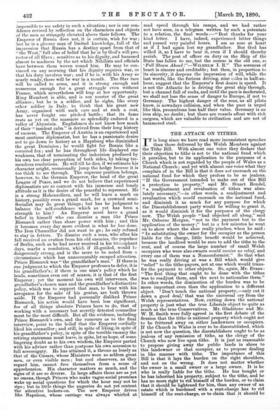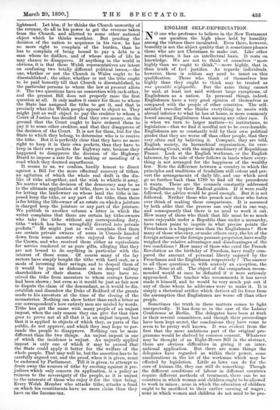not to go down to history as a Hapsburg who
diminished IT is long since we have read more inconsistent speeches lightened. Let him, if he thinks the Church unworthy of the revenue, do all in his power to get the revenue taken from the Church, and allotted to some other national object which he thinks worthier. But pending the decision of the nation to acquiesce in his view, he has no more right to complain of the burden, than he has to complain of being bound to pay a debt to a man whom he dislikes, and of whose mode of life he may chance to disapprove. If anything in the world is obvious, it is that these Welsh representatives are intent on confusing two totally different political issues,—the one, whether or not the Church in Wales ought to be disestablished ; the other, whether or not the tithe ought to be paid honestly till that Church is disestablished, to the particular persons to whom the law at present allots it. The two questions have no connection with each other, and the present Bill does not properly raise the first question at all. It only makes it easier for those to whom the State has assigned the tithe to get it, and that is precisely what the Welsh people appear to object to. They might just as well object to pay the creditor to whom a Court of Justice has decided that they owe money, on the ground that the Court ought to have ordered them to pay it to some other creditor, and that they disapprove of the decision of the Court. It is not for them, but for the State to which they belong, to determine who is to receive the tithe. But it is perfectly clear that they have no more right to keep it in their own pockets, than they have to keep in their own pockets the highway rate, because they happened to disapprove the decision of the Highway Board to impose a rate for the making or mending of a road which they deemed superfluous.
It seems to us, we confess, hardly honest to direct against a Bill for the more effectual recovery of tithes, an agitation of which the whole real drift is the dis- like of tithe altogether, and the wish to whittle it away. No matter what the decision of the democracy may be as to the ultimate application of tithe, there is no better case for letting the landowner on whose land the tithe is im- posed keep the tithe, or any part of the tithe, than there is for letting the life-owner of an estate on which a jointure is charged keep the jointure or any part of the jointure. We publish in another column a letter in which the writer complains that there are certain lay. tithe-owners who take the tithe without any corresponding duty, tithe " which has been wrongfully diverted into private pockets." He might just as well complain that there are certain private owners of sums in Consols handed down from some ancestor who enjoyed the favour of the Crown, and who received them either as equivalents for service rendered or as pure gifts, alleging that they are not bound to do anything in particular with the interest of those sums. Of course many of the lay rectors have simply bought the tithe with hard cash, as a mode of investing their savings, and to despoil them of it would be just as dishonest as to despoil railway shareholders of their shares. Others may have re- ceived the tithe from ancestors to whom corrupt favour had been shown ; but even so it would be just as fair now to dispute the claim of the descendant, as it would to dis- establish and disendow the Duke of Bedford of the grants made to his ancestors at the time of the closing of the monasteries. Nothing can show better than such a letter as our correspondent's how entirely men are misled by words. Tithe has got the name with many people of an unjust impost, when the only reason they can give for that view goes to prove not at all that it is an unjust impost, but that it is applied to objects of which they, as parts of the public, do not approve, and which they may hope to per- suade the people to disapprove. Nothing can be more different than the two things. An unjust impost is one of which the incidence is unjust. An unjustly applied impost is only one of which it may be proved that the State could apply it better for the welfare of the Whole people. That may well be, but the assertion has to be carefully argued out, and the proof, when it is given, must be endorsed by Parliament. Till it is given, to attempt to drain away the sources of tithe by exciting against it pre- judices which only concern its application, is a policy as ruinous to the sovereignty of the people, as it is unjust to the interests of those who enjoy it for the time being. Every Welsh Member who attacks tithe, attacks a fund on which his constituents have no more claim than they have on the Income-tax.







































 Previous page
Previous page